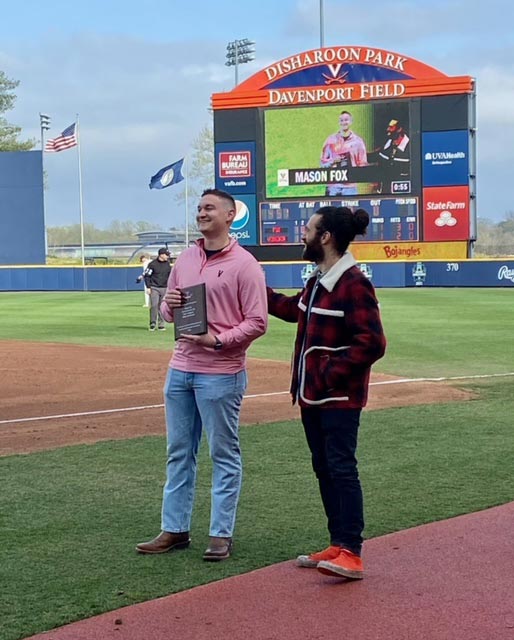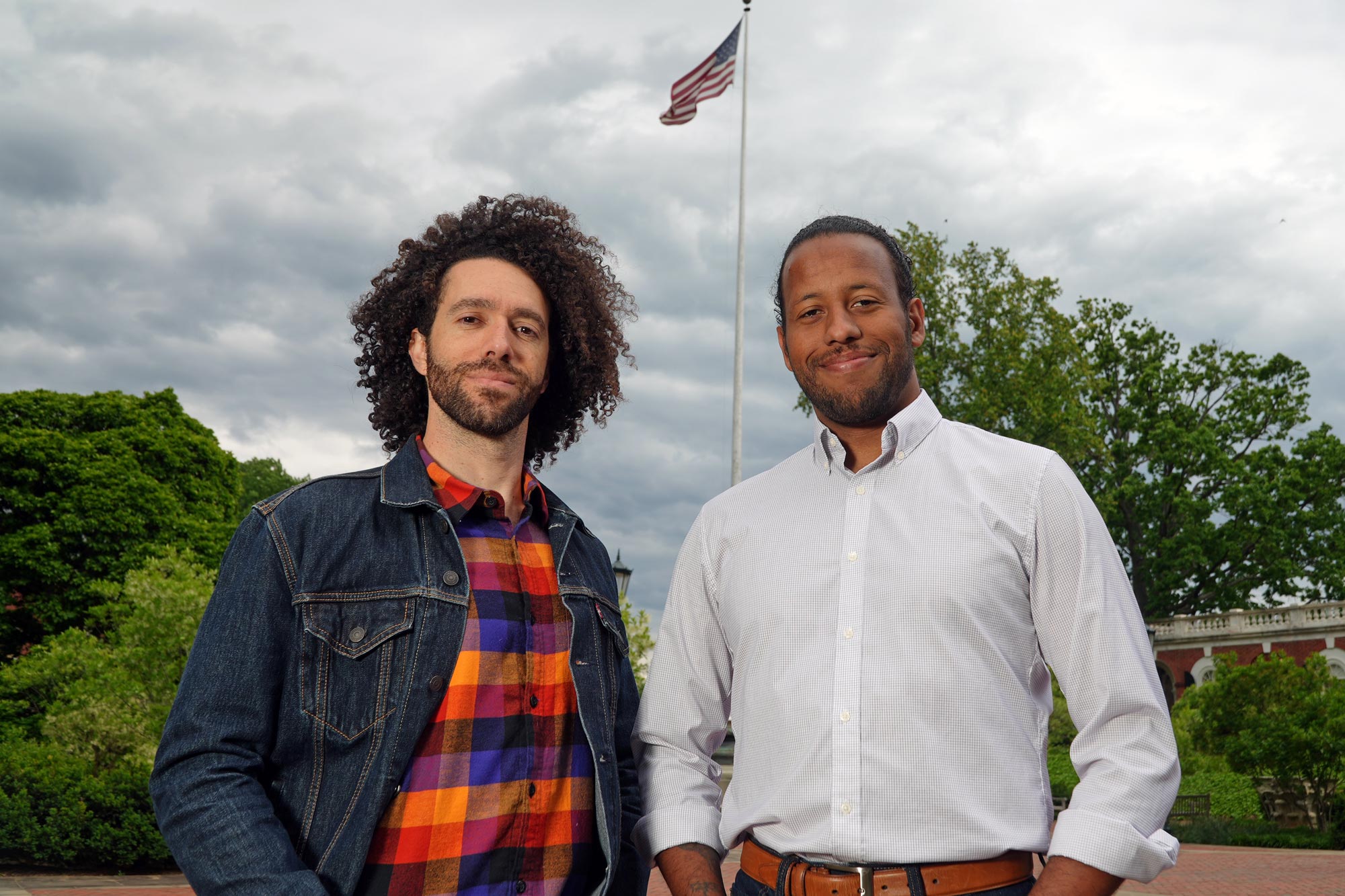Student veterans at the University of Virginia don’t ask for a lot of fanfare. That’s by design; no longer in uniform or on active duty, they’ve served their country and are quietly pursuing their studies at one of the premier public universities in the nation.
Still, it’s nice to be recognized for the sacrifices many of them have made to get to UVA, complete their education and walk the Lawn during Final Exercises. Thanks to support from an anonymous donor, 10 home baseball games this spring now include a brief on-field ceremony to recognize a student veteran at UVA. As their photo flashes on the video screen, with name, rank, branch of service and UVA school affiliation, they receive a plaque, a gift certificate and a standing ovation. The recognitions will continue in future seasons.
Copey “Marquis” Rice, the first student veteran to be honored, woke up to a text early one morning in February. A rising third-year student in the McIntire School of Commerce, he was asked to report to Disharoon Park later that day for UVA’s baseball game with Columbia University. “I tossed on my blue blazer, white shirt and khakis,” he said. “I wanted to look good.”
Rice, who spent eight years in the U.S. Army as a culinary specialist at Fort Bragg, North Carolina, and was deployed to Afghanistan as a performer with the U.S. Army Soldier Show, made sure to wear his Student Veterans of America lapel pin. As chair of the veteran service committee for the UVA chapter of Student Veterans of America, Rice is also a first-generation college student and a Posse Veterans Scholar.
As he walked onto the field, he was unprepared for the flood of emotions. “I had this happy, tumultuous feeling,” he recalled. “It was amazing to see everyone standing and applauding and I’m so grateful that they recognized my service. It was a priceless experience.”
Since then, other student veterans have had their own meaningful experiences, including a former high school baseball player who brought his entire family to the game. After the first Marine veteran was honored, baseball fans who were former Marines gathered around him to offer congratulations.
“We are honored that the Virginia baseball program can help pay tribute to student veterans at UVA,” head coach Brian O’Connor said. “The service and sacrifice of these students allows us the many freedoms we enjoy every day in the United States. I am proud that Virginia baseball can play a small role in recognizing these students, their sacrifices and all the ways that they enrich our great University of Virginia community.”
Bridging the GI Bill Gap
In any given year, anywhere from 60 to 80 undergraduate student veterans walk the Grounds. About 5% of graduate students are veterans, with representation in the Darden School of Business and the schools of Law, Medicine, Nursing, and Continuing and Professional Studies.
Undergraduate and graduate veterans tend to be slightly older than the overall student population. Many are first-generation students or come from underrepresented groups, and many are married with children, or single parents. Some have served in war zones and held military leadership positions. Most are attending UVA with funding and benefits through the GI Bill. But sometimes that lifeline comes up short.
Accordingly, a second feature of the anonymous gift will continue to support veterans after this year’s baseball season concludes. The donors worked with the Office of Student Affairs and leaders within the Student Veterans of America chapter at UVA to identify one of the most pressing issues facing student veterans – the need for gap funding.

UVA student veteran Mason Fox, left, is recognized at the March 25 baseball game at Disharoon Park, as Tomas De Oliveira looks on. (Contributed photo)
“You have these non-traditional students who are, for the most part, supporting themselves through school,” said Jeffrey Lovelace, assistant professor of commerce at the McIntire School, faculty adviser to Student Veterans of America at UVA and an Army veteran who served two tours of duty in Iraq. “The way military benefits are structured can lead students to experience lulls in their coverage. For example, if you finish a semester in mid-December, you don’t pick up the next semester until late January. That means the academic benefits that you’ve earned are not supporting you during those gap times.”
Tim Brown, a third-year McIntire student and former Navy corpsman, is past president of the UVA Student Veterans of America chapter. He was instrumental in working with the donors and the University to iron out the details of the gift.
Brown knew that the quirks of the academic year could pose challenges for student veterans.
“The way the GI Bill works is that the Veterans Administration pays the school tuition directly,” he said. “The VA also pays recipients a housing stipend, which comes once a month, and that goes away when you’re on these breaks. So functionally, this gap funding would be used for paying rent or maybe food for the kid, because that’s what the housing stipend is for. It’s your living allowance.”
He added that many in the veteran community find it difficult to ask for help when facing financial issues, and as a result, experience high rates of burnout. “We tough it out,” he said.
Allowing student veterans to focus on their studies rather than worrying about paying the bills is important on several levels. “I look at it this way: How do you remove the obstacles that make it difficult for these veterans to focus on their academic experience and to excel during their time here?” Lovelace said. “And if you know you’ve got some backup and an emergency valve that you can go to, then it puts your mind at ease. That’s just huge.”
The Thanos Snap
Tomas De Oliveira is the current UVA Student Veterans of America chapter president. A third-year mechanical engineering major, he’s a former U.S. Marine sergeant who served active duty for seven years followed by 2½ years of reserve time. He served in Afghanistan working in aviation mechanics as a flight equipment technician and as an embassy detachment commander for three years in Saudi Arabia, Moscow and Tokyo.
Based upon his life experience and current leadership role, he’s keenly aware that many student veterans face challenges when it comes to higher education. “I think you’ll find that very few traditional students at UVA have families, children, day care needs, transportation needs,” he said. “They’re not all moving their entire lives, abandoning a job, a career, in order to try to come to school. We are a population that has unique needs.”
One of De Oliveira’s goals is to connect as many on-Grounds student veterans with the Student Veterans of America as possible, including those transferring from institutions such as Piedmont Virginia Community College. He knows that the learning curve for entering veterans can be a steep one. He graduated from high school in 2003 and went into his first year of community college in 2017. “I started using my GI Bill after I transferred to UVA and then have had some ups and downs trying to navigate the educational system,” he said. “This was brand new.”
De Oliveira likens the feeling of disconnection that can come with being a student veteran to the comic book character Thanos, from the Marvel Universe. “There’s Thanos, who snaps his fingers and half of the population disappears,” he said. “And then, a few movies later, he undoes the snap and brings everybody back. As a veteran, that’s kind of what it feels like. It feels like you were snapped out of society for a few years. Time has moved on, we live full lives and then we come back to school to rejoin the same high-school peers we left all those years ago.”
Added Support, Broader Acceptance
In 2018, a Cornerstone Project report conducted by the University outlined the challenges undergraduate military veterans face at UVA and proposed solutions to resolve them, bringing the school more in line with peer institutions that have robust veterans’ programs, such as Florida State University and the University of North Carolina.
Of the report’s two primary recommendations – that the University create a director of veterans’ services position and open a veterans’ center – the second one has been fulfilled. In September 2021, the University opened the Veteran Student Center in the lower level of Newcomb Hall. The center is a joint project of the Student Veterans of America at UVA, the Office of the Dean of Students and the UVA Alumni Association’s Jefferson Trust. The Eli Banana Fund also provided support.





